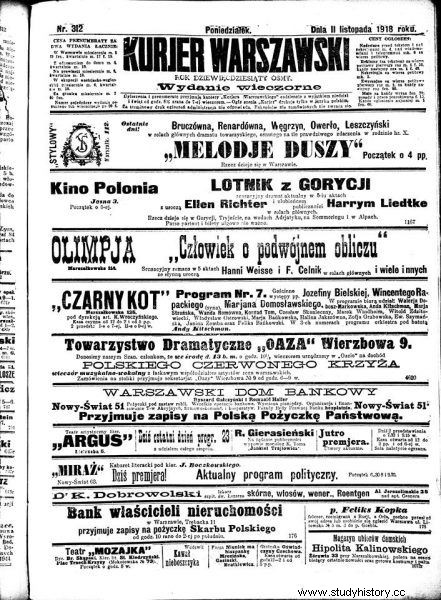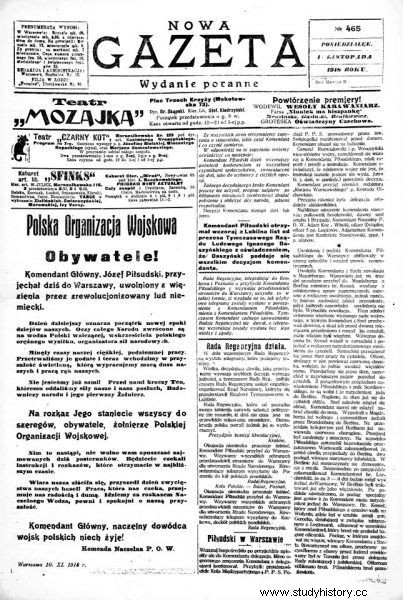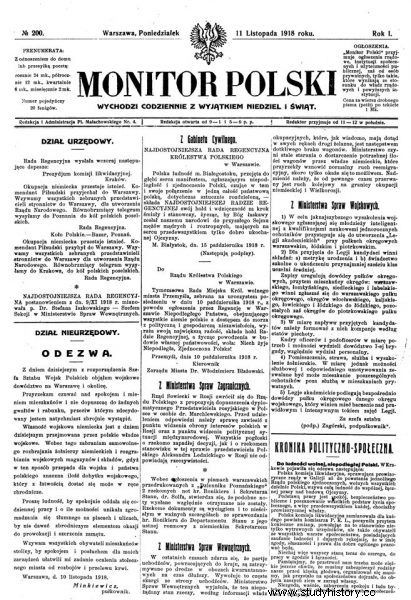"We are experiencing moments of historical significance, breakthrough moments about which future centuries will write," reported the editors of "Dziennik Wileński" on November 11, 1918. And they were right. Over the last century, thousands of publications about Poland regaining independence have appeared. But what was written about these events when they were just taking place?
Looking at the front page of the evening edition of "Kurjer Warszawski" or "Kurjer Poranny" one could get the impression that, in fact ... nothing big happened.
The second newspaper published an admittedly over-optimistic article entitled simply "The Commandant" ( the author wrote about "miracles of history that take place in our astonished, dazzled and joyful eyes", he also casually disclosed Piłsudski's address to the public ), but the vast majority of "ones" were taken up by theater posters.
Entertainment Niepodległa
In the evening "Kurjer Warszawski", any mention of Piłsudski, Poland's regaining independence or the end of World War I would be in vain to look for, because the commercials of performances of the capital's stages (cabarets, philharmonics, theaters and vaudeville) were devoted to the entire opening.

Kurier Warszawski
Hence, we know that at 5 pm in the Polonia Cinema at Jasna Street, "Lotnik z Gorycji" was screened - "a sensational drama current in 5 acts", Józefina Bielska, Wincenty Rapacki and Marjan Domosławski came to "Czarny Kot" for guest appearances, and the literary cabaret under the direction of J. Boczkowski presented a premiere show of the current political program. Only on the other side was there a place for the "extract from the armistice conditions".
Also in the morning edition, these issues were pushed to the background, had to give way to reports of the German revolution and ... minor announcements (including the sale of wood and coal, factory buildings and winter fruit).
Well, the Pole does not live by independence alone, although in fairness it should be added that the newspaper made up for this oversight with a special addition.
Bright Future
This does not mean, however, that all the editors treated the issue of the liberation of the Republic of Poland in a similar “trivial” way. In the morning issue, the Warsaw-based Nowa Gazeta reprinted the appeal of the Polish Military Organization, which informed about the groundbreaking events in solemn words:
Today marks the beginning of a new era in our history. The eyes of the entire nation are on the leader of fighting Poland, the resurrector of Polish military effort, and organizer of national forces.
The days of our hard underground work are over. We survived them with dignity and now we are entering a bright future, which we will work out with the power of our souls and the work of our hands.
The editors also devoted a lot of space to the "almost romantic" circumstances of Piłsudski's release and his return to the capital. But while this information seemed to be crucial for the inhabitants of Warsaw, the triumphant arrival of the Commander did not make any special impression on anyone in Greater Poland.

Nowa Gazeta
A sober view of things
Dziennik Poznański made only a one-sentence note on this subject ("From Warsaw they report that Piłsudski returned yesterday (on Sunday) to Warsaw"). On the other hand, he informed more precisely about the abdication of William II and the course of the revolution in Germany. Also more important than the Commander was ... the train disaster on the Dęblin-Strzemieszyce route, in which 40 soldiers were killed.
The editors of Dziennik Wileński also approached the issue "coldly", who sensitized readers:" A certain excitement in these conditions is understandable and no one should be surprised on the other hand, however, it should not obscure our common sense and a sober view of things. " Probably the best fulfillment of these postulates was "Monitor Polski", in which, apart from the appeal of the Regency Council and reports on the fighting in Galicia, there was also a place for information about teacher training courses in Warsaw and the Congress of the Association of Agricultural Circles.

Polish Monitor
Well, the variety of publications in the first days of the independent Second Republic of Poland perfectly reflects the chaos that prevailed at that time. After all, Poland was in the very center of the war events. The situation was changing dynamically, and the transfer of information between individual parts of the country (which had so far been three separate state organisms) was lame. Besides, after 123 years of captivity, not everyone immediately believed that freedom had become a fact.
Anyway, for many gray citizens November 11, 1918 was "a day like any other day" - of course they realized that groundbreaking things were happening, but after all, regardless of the political turmoil, they led their ordinary lives.
Bibliography:
- "Dziennik Poznański" R.60 No. 260 (November 11, 1918).
- "Dziennik Wileński" R. 3, No. 261 (November 11, 1918).
- "Kurjer Poranny" R.42, no. 2 (November 11, 1918).
- "Kurjer Warszawski" R.98, No. 312 (November 11, 1918) ed. morning and evening.
- "Polish Monitor:comes out every day except Sundays and holidays" R.1, No. 200 (November 11, 1918).
- "Nowa Gazeta:devoted to all phenomena of social life" R.13, No. 465 (November 11, 1918).
